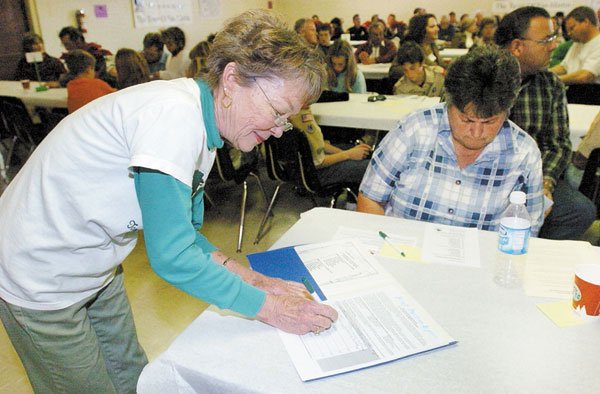Proponents of San Martin incorporation were stunned and
frustrated Tuesday morning when they heard Santa Clara County
supervisors oppose the idea unless the town pays nearly $10
million.
Proponents of San Martin incorporation were stunned and frustrated Tuesday morning when they heard Santa Clara County supervisors oppose the idea unless the town pays nearly $10 million.
By a 4-1 vote, supervisors said San Martin must pay the county $872,000 for 10 years with 25 years to pay the total amount.
The alliance spent several months negotiating with the county to create a “revenue neutrality” agreement, but one could not be reached. The Local Agency Formation Commission will therefore be responsible for imposing conditions. The commissioners would have to document any amount they decide should be paid by San Martin. The next meeting is scheduled for April 16.
“As far as I’m concerned, this is just one more example of the big boys pushing the little guys around,” said Sylvia Hamilton, president of the San Martin Neighborhood Alliance. “Thank God Don Gage was the voice of reason. The supervisors knew we had the legal authority, it was right there in front of them, but they did not take the time to review it.”
The alliance hired a lawyer who has experience with incorporation to create a document for the supervisors that will give a legal analysis of how the revenue neutrality law affects the current calculations.
“According to this document, to the law, all income and all expenses of the new town are included, and the difference between those determines whether you are revenue neutral or not,” Hamilton said.
Gage voted against the motion to oppose the incorporation. He proposed postponing the vote so there would be more time for negotiation.
“I don’t believe we have exhausted every opportunity to reach agreement, delaying the vote could help us reach compromise.”
There’s one thing that people seem to forget, Hamilton added.
“We live in this county also,” she said. “We don’t want to hurt the county, we wouldn’t do this if we thought it would hurt the county. At the same time, the people who live here have a right to incorporate if that’s what they want. All we’re asking is that (the county) follow the law.”
Financial issues were a concern among the supervisors who voted to oppose the incorporation.
“The notion of becoming a self-governing town has a lot of appeal,” Board Chair Supervisor Pete McHugh said in a statement. “However, it carries with it a pretty steep price tag. Not only does the town have to be able to cover the cost of service delivery and adequate reserves, its incorporation cannot do damage to surrounding areas by draining the much needed resources for delivery countywide.”
Supervisor Liz Kniss commented during discussion Tuesday morning that she was “surprised” there were no representatives from the cities of Morgan Hill and Gilroy in attendance because the cities opposed the incorporation. Supervisor Blanca Alvarado agreed, saying both cities had expressed support of the county staff recommendation to oppose the incorporation.
But mayors for both cities disagreed with that assessment.
Gilroy Mayor Al Pinheiro said city council members have expressed concerns about some of the proposed boundaries, but there has never been a formal vote opposing the incorporation.
“We have given some indication some of the concerns we have … but there has been no official vote against it, none of the council members has taken the position of opposing it.”
Morgan Hill Mayor Steve Tate said the council has never opposed the incorporation.
“In fact, we have sent them a letter saying that they have our future support as a town, and that if we can make our services work together more efficiently, we certainly want to do that.”
Both Alvarado and Kniss expressed concerns that the community would not be able to afford to provide services to residents.
“I have not heard anything persuasive that demonstrates that San Martin would be able to support itself,” Kniss said. “The proponents’ goal is to maintain agricultural identity but the analysis shows that their current configuration will not provide a sufficient tax base.”
Hamilton said the proposed town could support itself.
“That’s why you have the comprehensive fiscal analysis,” she said. “If they would review that document, they would see how we’ve accounted for the expenses that the new town would have. There would be enough there to put some in reserves and have a little surplus.”











